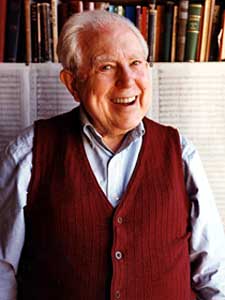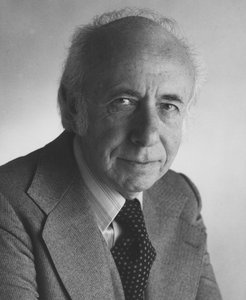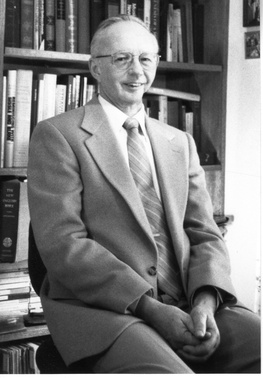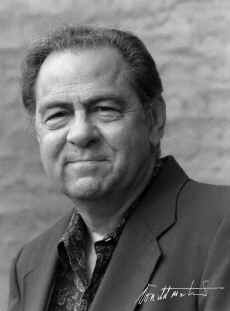
The Pulitzer Prize for Music is one of seven Pulitzer Prizes awarded annually in Letters, Drama, and Music. It was first given in 1943. Joseph Pulitzer arranged for a music scholarship to be awarded each year, and this was eventually converted into a prize: "For a distinguished musical composition of significant dimension by an American that has had its first performance in the United States during the year."

Milton Byron Babbitt was an American composer, music theorist, mathematician, and teacher. He was a Pulitzer Prize and MacArthur Fellowship recipient, recognized for his serial and electronic music.

Elliott Cook Carter Jr. was an American modernist composer. One of the most respected composers of the second half of the 20th century, he combined elements of European modernism and American "ultra-modernism" into a distinctive style with a personal harmonic and rhythmic language, after an early neoclassical phase. His compositions are performed throughout the world, and include orchestral, chamber music, solo instrumental, and vocal works. The recipient of many awards, Carter was twice awarded the Pulitzer Prize for his string quartets; he also wrote the large-scale orchestral triptych Symphonia: sum fluxae pretium spei.
Alfred Whitford (Fred) Lerdahl is an American music theorist and composer. Best known for his work on musical grammar, cognition, rhythmic theory and pitch space, he and the linguist Ray Jackendoff developed the Chomsky-inspired generative theory of tonal music.

Morton Gould was an American composer, conductor, arranger, and pianist.
Karel Husa was a Czech-born classical composer and conductor, winner of the 1969 Pulitzer Prize for Music and 1993 University of Louisville Grawemeyer Award for Music Composition. In 1954, he emigrated to the United States and became an American citizen in 1959.

William Quincy Porter was an American composer and teacher of classical music.

Leslie Raymond Bassett was an American composer of classical music. Bassett received the 1966 Pulitzer Prize in Music. Bassett had a lifelong relationship with the University of Michigan School of Music. He received the MM there, and in 1956 was the recipient of the university's first DMA. Bassett was a member of the University of Michigan faculty from 1952 until 1992. Upon retirement from active teaching in 1992, he held the title of Albert A. Stanley Distinguished University Professor Emeritus of Composition until his death in 2016.

Donald James Martino was a Pulitzer Prize winning American composer.
Michael Charles Colgrass was an American and Canadian musician, composer, and educator. He was an associate composer of the Canadian Music Centre.

Kit Armstrong is an American classical pianist, composer, organist, and former child prodigy of British-Taiwanese parentage.
Giants in the Earth is a 1951 Pulitzer Prize-winning opera in three acts and four scenes by composer Douglas Moore. The work uses an English libretto by Arnold Sundgaard (1909–2006) after Ole Edvart Rølvaag's 1924-5 novel of the same name. The idea for the opera was originally conceived by Sundgaard, and depicts a story of tragedy and romance among Norwegian American settlers of Dakota Territory in 1873. Composed during 1949-1949, the work was premiered on March 28, 1951 at Columbia University's Brander Matthews Theatre by the Columbia Opera Workshop.
Jefferson Friedman is an American composer. He lives in Los Angeles. He received an M.M. degree in music composition from The Juilliard School, where he studied with John Corigliano, and a B.A. from Columbia University, where he studied with David Rakowski and Jonathan Kramer. He also studied with George Tsontakis and Christopher Rouse.
Christos Hatzis is a Juno Award-winning Greek-Canadian composer. Many of his compositions are performed internationally, and he is a professor at the Faculty of Music, University of Toronto.
String Quartet No. 2, Musica Instrumentalis (1997) is a string quartet by Aaron Jay Kernis, inspired by renaissance and baroque dances, composed for the Lark Quartet and awarded the Pulitzer Prize in 1998, with a special citation to George Gershwin. His first quartet being named Musica celestis:
My new string quartet started off because I wanted to deal with baroque dance forms and medieval dance rhythms. There wasn't an image—it developed from purely musical ideas. This was a case where the piece turned out to be formally very different from what I first expected. I thought it would be five movements, but I started cannibalizing one movement into another and wound up with three. The first movement is like a dance medley, with a first big A section and a closing A section that is a development of the opening medley. Stuck in the middle of these two A's is a minuet and trio that originally was an entirely separate movement. While working on the first movement, I decided that the relaxation that I needed between those A sections was one of the smaller movements I'd already conceived. So I took one and squashed it in. That's one way that a piece can become significantly transformed during the act of composition.
Lilacs for voice and orchestra is a musical composition by George Walker that was awarded the 1996 Pulitzer Prize for Music. The work, scored for soprano soloist and orchestra, was the unanimous choice of the Pulitzer prize jury. Walker was the first African-American composer to be awarded the prize.
Whispers Out of Time (1984) is a composition by Roger Reynolds for string orchestra. He was awarded the 1989 Pulitzer Prize for Music for the piece, causing Kyle Gann to quip that it was the first time it was being given to an experimental composer since Charles Ives in 1947. It premiered on December 11, 1988, at Buckley Recital Hall, Amherst College, Massachusetts, with Harvey Sollberger conducting.
- The soul is a captive
- A magma of interiors
- Like a wave breaking on a rock
- The surprise, the tension are in the concept
- A chill, a blight moving outward
- The portrait's will to endure
The Canticle of the Sun is a musical composition by Leo Sowerby (1895–1968) setting Matthew Arnold's English translation of Francis of Assisi's "Canticle of the Sun" for chorus and orchestra in 1945; the work was awarded the Pulitzer Prize for Music the following year. The first performance was in New York at Carnegie Hall by the Schola Cantorum and the New York Philharmonic on April 16, 1945. The first recording of it by Chicago's Grant Park Orchestra and Chorus under Carlos Kalmar was released in June 2011. The piece was commissioned by the Alice M. Ditson Fund.
Christopher Cerrone is an American composer based in New York City. He was a 2014 finalist for the Pulitzer Prize, a 2014 Fromm Foundation commission recipient, a 2015 Rome Prize winner in Music Composition, and has received numerous awards from ASCAP.
Variations for Orchestra is a single-movement composition for orchestra by the American composer Leslie Bassett. The piece was first performed in Rome in 1963 by the RAI National Symphony Orchestra under the conductor Ferruccio Scaglia. It was later given its United States premiere at the Philadelphia Academy of Music on October 22, 1965 by the Philadelphia Orchestra under Eugene Ormandy. The work was awarded the 1966 Pulitzer Prize for Music.
This page is based on this
Wikipedia article Text is available under the
CC BY-SA 4.0 license; additional terms may apply.
Images, videos and audio are available under their respective licenses.







